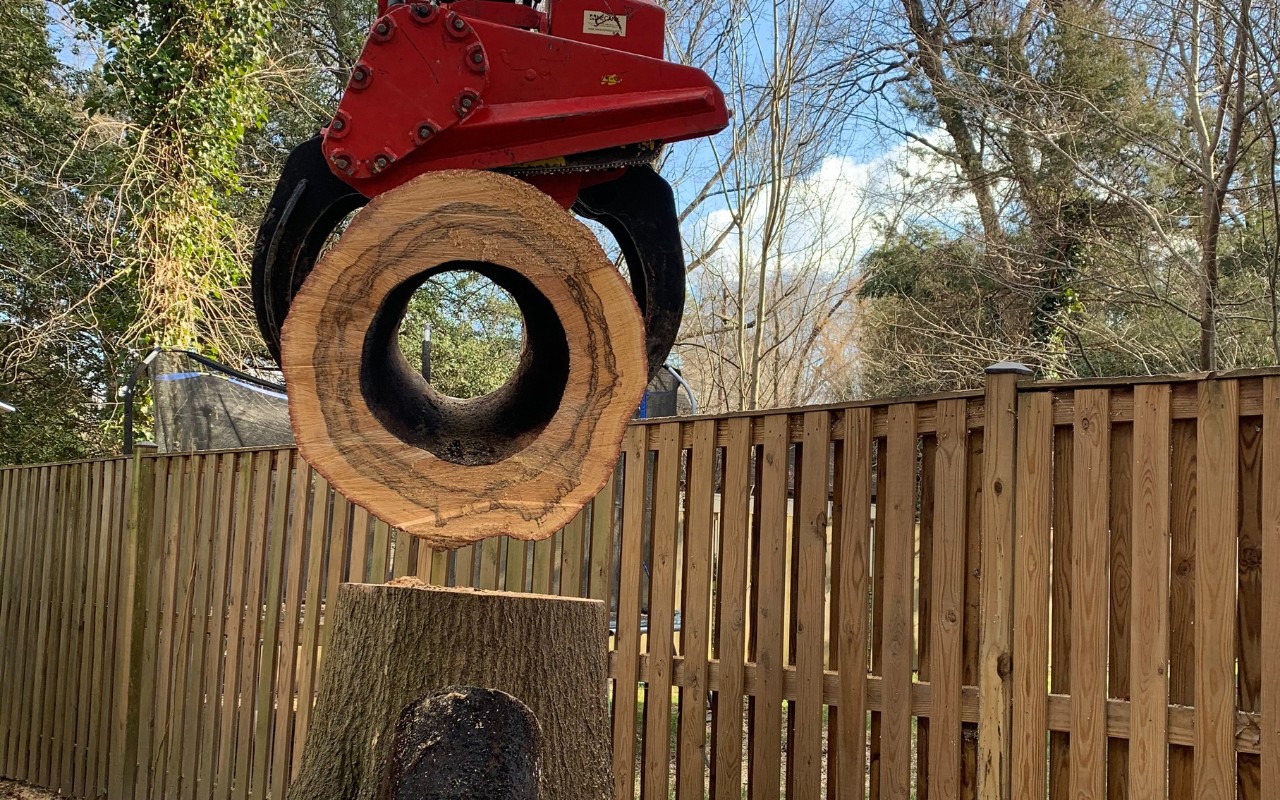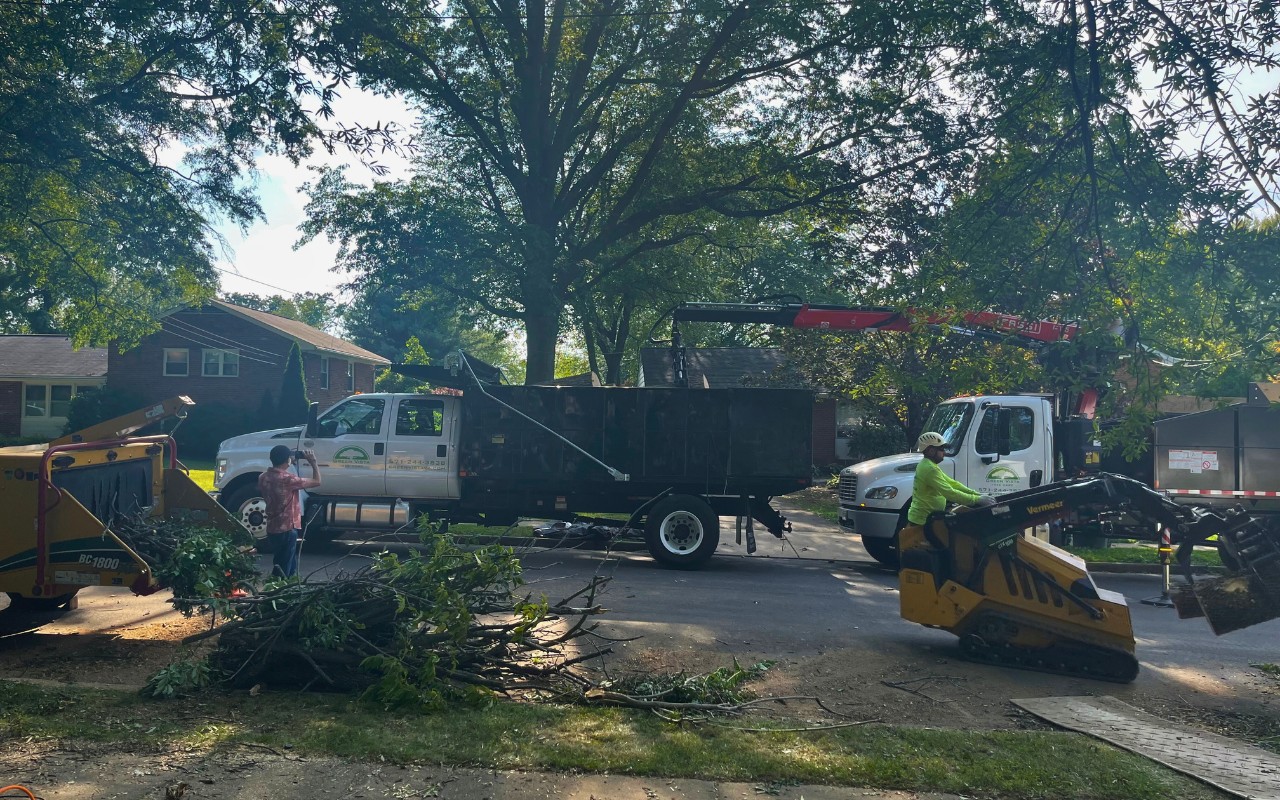You know that saying, “If a tree falls in a forest and no one is around to hear it, does it really make a sound?” Well, suppose a tree (or a branch) falls on a person or any type of structure. If a tree service doesn’t have insurance, you will hear about it forever from insurance companies, medical offices, and possibly even lawyers.
Learn more about the importance of working with a company with the appropriate tree service insurance coverage in Northern Virginia.
Key Takeaways:
- Tree service companies without proper insurance can leave homeowners financially responsible for accidents, damages, and injuries on their property.
- Tree work is among the most dangerous industries, with a fatality rate of 17 per 100,000 full-time equivalent workers, making proper insurance coverage essential for any company performing tree services.
- Legitimate tree service companies should carry both general liability insurance and workers’ compensation insurance that specifically covers tree work.
- Homeowners should always request and verify a Certificate of Insurance (COI) sent directly from the insurance company before hiring a tree service.
The Risk of Working with a Company That Doesn’t Have Tree Service Insurance
Many homeowners jump on tree removal deals that seem too good to be true. A contractor may offer a quote that comes in well below what anyone else has. You hire them for the work, but then an accident happens, and you find out they don’t have insurance. You could be on the hook to pay for damages or medical bills yourself.
This unfortunate situation is all too common in Northern Virginia. The allure of a “tree guy” with a chainsaw who can get the job done quickly and cheaply is often hard to resist. And it’s easy to say “yes” to the landscaper you already work with who offers to add “tree trimming” to his normal tasks.
If you want to protect yourself and your property, you must work with a company with insurance. The reason is simple: tree care is one of the most dangerous industries you will find in our country.

Trees can have internal issues that make them difficult and dangerous to work with.
Tree Work Is Dangerous
Tree work is one of the most dangerous industries in the county, with potential injuries from falling objects, equipment accidents, and more.
According to the Tree Care Industry Association, the annual fatality rate for tree work is 17 per 100,000 full-time equivalent workers. This starkly contrasts the national average for all industries, which typically sits between 3.4 and 3.8.
Accidents and deaths are not something that happen only in the distance, as there are numerous stories of people injured or killed when working on trees in our area. For instance, a sad story came out of Burke when a tree crane fell on a house and killed a woman. In another incident, a branch strike a worker in the head and kill him in Dominion Hills.
These are just some of the stories from Northern Virginia. Many tree care workers end up injured on the job, even if it doesn’t make the news. Some of the risks of tree work include:
- Heavy branches and tree trunks
- Poor structural integrity of dead or dying trees
- Heavy equipment
- Climbing into tree canopies over 50 feet in the air
Unfortunately, landscapers and “tree guys” are usually more than willing to take on the dangerous tasks that experienced professionals are certified to perform, but they don’t have the same technical training and experience, nor do they carry the same level of insurance.
PRO TIP: Want to learn more about the dangers of trees and working on them? Check out our previous articles on the topic:
Types of Insurance Coverage for Tree Care Companies
There are two types of insurance coverage every tree care company should have: general liability and workers’ compensation.
General Liability Insurance
Although it’s called “general” liability insurance, it’s extremely specific when it comes to the type of work the insurance policy covers.
Only hire a company that can show you a valid insurance policy that explicitly covers tree work.
Why?
Other business types that do “tree work”, such as landscapers, may not have insurance to work above certain heights or do comprehensive pruning. If there is an accident while they work on your tree, you could end up on the hook to pay for damages.
Workers’ Compensation Insurance
Here in Virginia, all companies with more than two employees (including both part-time and full-time employees, subcontractors, and the owner) must carry workers’ compensation insurance.
As with general liability insurance, look for workers’ compensation insurance that specifically says it’s for tree care, not just landscaping or similar work.
You may find that a company isn’t covered for tree work although they still say that “we have workers’ compensation insurance for our employees”. Tree work coverage is costly because of how dangerous the industry is.
Some companies doing tree work try to cut corners by classifying themselves as landscapers instead (or forgoing workers’ compensation entirely). This saves them money in the short term and allows them to offer you a lower price on tree work, but it’s just pushing the risk onto you.
Without workers’ compensation (or without the right type of coverage), the company owner is legally responsible for work injuries to themself and any crew members. However, as the property owner who hired the company, you may be on the hook if an employee is injured and the company owner cannot or will not pay.
Your option at that point is to sue the company to recover damages. But until that’s settled, you may have to continue paying for the injured person’s medical bills, lost wages, and other costs associated with the injury.

Protect Yourself by Always Requesting a Certificate of Insurance
To ensure that you’re adequately protected, request to see a Certificate of Insurance (COI). The insurance company will send it directly to you so you can be sure that the policy is real and hasn’t expired (a photocopy provided by the business owner is a good start, but you should still ask for the “real” COI). Most insurance companies will do this for free.
PRO TIP: To make things transparent for our customers, we provide a copy of our COI online on our FAQ page. Of course, when you meet with us for your service, we’ll be happy to show it to you then as well.
If a company takes offense to your request for this information, you probably shouldn’t be doing business with them.
What to Look for When You See a Certificate of Insurance
The dollar value covered by the insurance policy is also important. It should be enough to pay for any costs arising from an accident or injury. Some minimum limits to look for are:
- General Liability: $1 million each occurrence and $2 million aggregate
- Automobile Liability: $1 million each accident
- Umbrella Liability: $1 million
- Workers’ Compensation: $500,000 per accident
Frequently Asked Questions About Tree Care Insurance
We understand insurance can be a complicated subject, so we’ve answered some of the common questions we get from our customers about it.
Will my homeowners’ insurance cover accidents from tree work?
Typically, your homeowners’ insurance would not cover damage caused by an uninsured contractor. This is why it’s vital to work with a fully insured tree service anytime you need work done on your property.
Does proper insurance coverage increase the price of tree work?
Yes, a company having the necessary insurance will likely increase the cost of working with them. Tree industry insurance is some of the most expensive for a company to have, due to the dangerous nature of the work. However, the extra price provides peace of mind in the event of an accident and can save you from having to pay for repairs and medical bills.
Is tree service insurance different than landscaping insurance?
Yes, these two types of insurance are typically different. Landscaping insurance likely won’t cover the same type of work at heights that tree services do.
Insured, Experienced, and Local – That’s Green Vista Tree Care
The next time you get a proposal for tree work (especially one that seems too good to be true), ask to see policy documents for general liability and workers’ compensation insurance. Low-cost providers generally don’t have both types of insurance and/or have very low policy limits, putting you and your family at risk should an accident happen on your property.
At Green Vista Tree Care, we carry all the necessary insurance to protect the company, our team, and everyone who works with us. We’ll be glad to show you our COI when you ask. We offer help with all your tree needs, from trimming to removing hazardous trees. Call us today at 571-244-3838 or request a quote online to see the difference in working with an insured company.
Get helpful tips, local news, inspiring stories, and more delivered right to your inbox every month. Don't miss another issue - join today!





